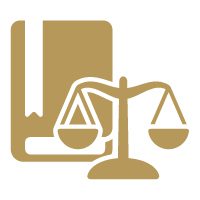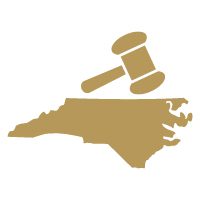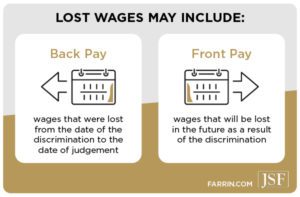You deserve to be treated fairly at work.
Employees have rights, too. We will fight to protect those rights.
Our Experienced NC Employment Lawyers Are Ready to Fight for You
As with all relationships, there is a balance of power between the employer and the employee. Because the employer usually holds most of the power, the employee can be at risk – both personally and professionally. Since 1997, the Law Offices of James Scott Farrin has helped 73,000+ people. In the area of employment law, we apply our resources, knowledge, and experience towards fighting to protect the rights of everyday people trying to make an honest living.
The Law Offices of James Scott Farrin has a history of fighting to level the playing field and help the underrepresented. Our firm led a team of firms across the country in one of the largest U.S. civil rights cases that resolved for $1.25 billion.1 Let us help you.
The Ultimate Guide to North Carolina Employment Law
- What Does Employment Law Cover in North Carolina?
- What Do I Do if I Believe an Employer Is Violating My Rights?
- Why Do I Need a North Carolina Employment Lawyer?
- What Does a North Carolina Employment Attorney Do?
- What Is My North Carolina Employment Case Worth?
- My Employer Says I'm Not Entitled to Anything, Should I Believe Them?
- How Do I Contact the Law Offices of James Scott Farrin?
What Does Employment Law Cover in North Carolina?
Employers generally have more authority, money, and leverage when dealing with the people who work for them, and unfortunately, this imbalance of power sometimes leads to unfair treatment of employees.
You may have a case if you are facing any of the following employment issues:
- Overtime & Unpaid Wages – Failure of an employer to pay an employee for time worked that is not part of a regular work shift (i.e. off-the-clock work) or overtime for hours worked over 40 hours in a workweek
- Wrongful Termination – Illegal termination of an employee, such as in violation of anti-discrimination laws or breach of contract
- Discrimination – Prejudicial treatment of an employee seeking, obtaining, and/or holding employment based on race, religion, color, national origin, age, sex, disability, or genetic information
- Harassment – Unwelcome, discriminating conduct that creates a hostile, intimidating, or offensive work environment
- Retaliation – Punishment of a job applicant or employee (e.g. firing, job reassignment, demotion, or salary reduction) for engaging in a legally protected activity, such as asserting the right to be free from discrimination and harassment or participating in a complaint process
- Family and Medical Leave – Denial of unpaid, job-protected leave and continuation of group health insurance coverage for eligible employees for specified family and medical reasons
Our employment law team has also advocated for the rights of people dealing with unsafe and unhealthy work conditions, COVID-related employment issues, and issues specific to migrant and seasonal agricultural workers.
What Federal Agencies and Laws Protect Workers?
The Equal Employment Opportunity Commission (EEOC) enforces federal laws that prohibit discrimination against an employee or job applicant because of the person’s race, color, religion, sex (including pregnancy, transgender status, and sexual orientation), national origin, age (40 or older), disability, or genetic information. These laws apply to all work situations including hiring, recruiting, firing, promotions, harassment, training, pay, and benefits.
The EEOC enforces the following workplace anti-discrimination laws:
- Title VII – protects employees and job applicants from job discrimination based on race, color, religion, national origin, and sex
- Equal Pay Act (EPA) – prohibits sex-based wage discrimination
- Age Discrimination Employment Act (ADEA) – protects employees and job applicants 40 years or older from age-based discrimination
- Americans with Disabilities Act (ADA) – protects people with disabilities from work-related discrimination
- Pregnancy Discrimination Act (PDA) – prohibits discrimination at work on the basis of pregnancy
- Title II of the Genetic Information Nondiscrimination Act (GINA) – prohibits genetic information discrimination in employment
The Department of Labor (DOL) administers and enforces the following laws:
- Fair Labor Standards Act (FLSA) – establishes minimum wage, overtime pay, recordkeeping, and youth standards affecting employees
- Family and Medical Leave Act (FMLA) – entitles employees to take unpaid, job-protected leave for specified family and medical reasons with continuation of group health insurance coverage
- Uniformed Services Employment and Reemployment Rights Act* (USERRA) – protects servicemembers’ and veterans’ civilian employment rights and prohibits discrimination based on military service or affiliation
*The Department of Justice also handles USERRA claims.
Is There a North Carolina Fair Employment Practices Agency?
Yes, the Civil Rights Division-Employment Discrimination Section (CRD-EDS) of the North Carolina Office of Administrative Hearings (OAH) is the state’s Fair Employment Practices Agency (FEPA). The CRD-EDS is designated to serve as North Carolina’s deferral agency of the EEOC for charges filed by state and local government employees. The CRD-EDS works with the EEOC to enforce state and federal anti-discrimination laws in North Carolina through “work sharing agreements” and “dual filing” to avoid duplication of effort.
To file a charge with the CRD-EDS, mail, email, telephone, or visit:
Civil Rights Division – Employment Discrimination Section
1711 New Hope Church Road
Raleigh, NC 27609
(984) 236-1919
CRD-EDS staff email addresses can be found here.
What Do I Do if I Believe an Employer Is Violating My Rights?
First things first: call an experienced NC employment lawyer to discuss your case. Our team will evaluate your case for free – there is no cost or obligation.
Here are additional actions you can take if you feel that your employer has violated your rights:
- Collect proof.
Gather any text messages, emails, voicemails, phone calls, pay stubs, and any other records of the violation. Make copies so you can give one to your employer. - Create a timeline.
Chart when violations occurred, when you reported the violation, and when and how your employer reacted (or didn’t). - Inform your employer.
Employers cannot correct wrongs if they do not know about them. Inform your employer of any disability, pregnancy, or medical condition that needs accommodation. File a complaint with HR or the appropriate person at your company or your supervisor if you are being harassed or discriminated against. Give documentation of what you have experienced to your supervisor or HR department. If they are already aware and have not made an effort to correct the violation, this step may strengthen your case. - Document all communication.
Take note of what you have said about the violation(s) to whom, as well as all responses you have received.
At the Law Offices of James Scott Farrin, we want to level the playing field between you and your employer. We will help you understand if your employer has violated any employee protection laws, and we will fight for the fair compensation you may deserve.
Have You Experienced Any of These Workplace Violations?
There are laws in place to protect employees, but many people go to work and experience harassment, discrimination, and unfair treatment on a daily basis. If you can answer yes to any of these questions, you may have a case:
- Has a supervisor offered you a promotion, raise, or other benefit in return for a sexual favor?
- Has a co-worker repeatedly made suggestive or demeaning remarks or offensively touched you without permission?
- Does your employer make you work overtime and not pay you for it?
- Are you misclassified as a salaried employee preventing you from earing overtime pay?
- Do you think your employer fired you because of your age, race, disability, or religion?
- Were you fired after having a baby or after informing your employer of your pregnancy?
- Were you fired after fighting for unpaid wages or commissions or overtime?
These are only a few of the many unfair employment scenarios that happen every day throughout the state. We urge you to discuss your own employment situation with an NC employment rights lawyer.
Do You Have a Possible Workplace Harassment Claim?
If you feel that you are being harassed at work, ask yourself these four questions to see if you have a possible/viable workplace harassment claim:
- Did you object to the harassment behavior?
Workplace harassment and discrimination claims can be strengthened when the employee has objected to the behavior in question. So think back and determine if, and how, you responded to the harassment. It might have been an informal objection, as with a verbal “please stop” or “that’s not funny” comment, or a formal response, such as a filed complaint with the HR department or a union representative. - Did others witness the harassment behavior?
Ask your fellow workers if they saw the harassment. Also ask if they, too, have had similar experiences. Sometimes, there is a repeated pattern of behavior that can be used to strengthen your claim. - Do you have any proof of the harassment?
In addition to witnesses, check your emails, notes, texts, camera photos, and personnel file for any proof of the harassment behavior. - How did management respond?
Your claim will also need to describe how, and if, management responded to your objection of the behavior and to any complaint you may have filed.
You deserve to feel safe and respected in the workplace.
[ Back to Top ]Why Do I Need a North Carolina Employment Lawyer?
We encourage people who feel that they have been unfairly treated at work to consult with an NC employment lawyer for the following reasons:
 |
Knowledge: Employment lawyers know what laws exist to protect you at work and can use this knowledge to fight for you to be compensated if those laws are broken. |
| Experience: A history of working on similar cases helps employment attorneys anticipate likely outcomes, know when more proof may be needed, and understand where to look for it. | |
 |
Objectivity: A lawyer can often see aspects of a case that a victim of discrimination or unfair treatment cannot. When you are personally involved in abusive work practices, it’s difficult to be objective. |
 |
NC Know-How: Every state has its own procedures and regulations. A North Carolina employment lawyer will be familiar with North Carolina’s laws, FEPA rules, and possibly a local employer’s history with employee grievances. |
So, why should you hire an employment lawyer? Because no one should have to endure feeling unsafe, mistreated, or discriminated against at work.
[ Back to Top ]What Does a North Carolina Employment Attorney Do?
Simple answer: an attorney helps you protect your rights as an employee. While your situation at work is unique, an experienced employment attorney may have worked with other clients in similar circumstances and can provide objectivity and historical case references to try to build your case.
A North Carolina employment attorney can:
- Explain your rights and NC employment laws
- Seek proof of mistreatment or discriminatory behavior
- Keep the case on track and help you adhere to filing deadlines
- Review employment contracts
- Mediate between you and your employer
- Calculate front pay and back pay, if appropriate
- Advise and recommend legal action
- Help you file a claim with the EEOC
- Represent you in a civil lawsuit against your employer
You do not need to take on this battle by yourself. And you probably shouldn’t. Dealing with discrimination at work can be demoralizing and exhausting. We urge you to seek guidance from a seasoned professional who knows employment law.
Our firm also has an experienced team of workers’ compensation attorneys who fight to protect the interests of people who have been injured on the job. Contact us today for a free case evaluation of any of your possible employment-related claims.
[ Back to Top ]What Is My North Carolina Employment Case Worth?
Just as every job is different, every employment law case is different. For many cases, potential compensation could include:
Lost wages and benefits
- Pain and suffering
- Promotion
- Reinstatement to position
- Hiring
- Legal fees and court costs
An experienced employment attorney can help you determine the harms and losses you may have suffered and how best to try to establish and prove them.
Can I Afford an NC Employment Lawyer?
Yes. If you choose a lawyer that works on a contingency fee basis, you won’t have to pay up-front fees.
At the Law Offices of James Scott Farrin, there are no hourly attorney’s fees to worry about, and your initial case evaluation is free.2 This allows us to help those who may not have the funds to retain a lawyer, but who may need legal help the most. We are able to offer our assistance in this way because we are confident in our team and collect an attorney’s fee (a percentage of the total recovered amount) only if we recover for you.
[ Back to Top ]My Employer Says I'm Not Entitled to Anything, Should I Believe Them?
You should absolutely not rely on your employer. Instead, we suggest that you trust your instinct that something is wrong, and contact an NC employment lawyer to discuss the specifics of your case. Sadly, some employers may tell you something that serves their purpose, not yours, and some may even resort to threats or other tactics to convince you to drop your claim.
This is not right, and often it’s not legal.
[ Back to Top ]How Do I Contact the Law Offices of James Scott Farrin?
If you feel your employer is treating you differently than other employees, are being harassed at work, are being denied pay for overtime, or are experiencing any of the other situations described above, contact us or call us at 1-866-900-7078 today for a free and confidential case evaluation. These are serious issues that deserve thoughtful attention.
People give a lot of their time, energy, and attention to their jobs. If you work a 40-hour week, you may be spending more time at work than you are sleeping each night! When you devote that much of your life to work, you expect to be treated, and paid, fairly.
At the Law Offices of James Scott Farrin, we help people fight back. In 2023, we recovered $225+ million in total compensation for more than 5,000 clients.1
Give us a call today – it’s time to tell them you mean business.
READ MORE
- Why Hire an Employment Law Attorney
- North Carolina Employment Laws
- Overtime & Unpaid Wages
- Wrongful Termination
- Workplace Discrimination
- Workplace Harassment
- Workplace Retaliation
- FMLA
- Labor Laws for Breaks in North Carolina
- What Is Considered Full-Time in North Carolina
- Labor Laws for Exempt Employees in North Carolina
- Vacation and Holiday Pay in North Carolina
- North Carolina Right to Work Laws




 Lost wages and benefits
Lost wages and benefits